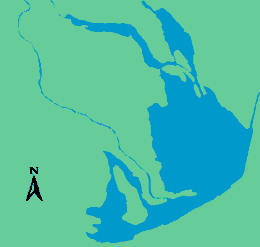Fishing
- Possession and Transport of Exotic Aquatic Species
- Licenses & Regulations
- ShareLunkers
- Fish Identification
- Fish Consumption
- Texas Freshwater Fisheries Center
Water Resources
- Texas Reservoir Levels
- US Army Corps of Engineers
- Texas Water Issues
- Golden Alga
- Aquatic Vegetation
PO Box 116
Mathis, Texas 78368
(361) 547-6222, dial 5 Ext:241
Dusty McDonald, Biologist
Lake Findley (Alice City Lake)
Quick Links: Fishing Regulations | Angling Opportunities | Cover & Structure | Tips & Tactics
Lake Characteristics
Location: Jim Wells County, San Fernando Creek basin, 1 mile north of Alice,
Texas
Surface area: 247 acres
Maximum depth: 12 feet
Impounded: 1965
Water Conditions
Normal Elevation:
192 ft. msl
Fluctuation: 1-3 feet
Normal Clarity: Stained to partly clear
Reservoir Controlling Authority
City of Alice
PO Box 3229
Alice, Texas 78333
(361) 668-7210
Aquatic Vegetation
Pickerelweed, spikerush, spatterdock, white waterlily, water stargrass, coontail and bulrush
Predominant Fish Species
- Largemouth bass
- Hybrid striped bass
- Crappie
- Channel catfish
- Bluegill & redear sunfish
Lake Records
Stocking History
Latest Survey Report
Lake Maps
No maps are available.
Fishing Regulations
All species are currently managed under statewide regulations.
Angling Opportunities
Catfish are the most popular sportfish in the reservoir. Channel catfish are regularly stocked and provide great sport and excellent table fare. Both black and white crappie are plentiful with many of respectable size. Sunfish in large numbers make panfishing an enjoyable pastime.
| Species | Poor | Fair | Good | Excellent |
|---|---|---|---|---|
| Largemouth Bass | ||||
| Hybrid Striped Bass | ||||
| Catfish | ||||
| Crappie | ||||
| Sunfish |
Fishing Cover/Structure
This lake is very shallow and has very little main lake cover and structure. Rip rap near the dam provides excellent habitat for catfish, crappie, and largemouth bass while more open areas provide habitat required by hybrid striped bass. Deeper creek arms are dominated by overhanging brush, numerous laydowns, and submerged brush which provide excellent habitat for crappie, sunfish, catfish, and largemouth bass. Shallow flats encompass most of the north end of the reservoir and provide an excellent breeding ground for forage species. Flooded terrestrial vegetation, during periods of high water, provides excellent habitat for all gamefish species.
Tips & Tactics
Hybrid striped bass respond readily to most shad imitating lures such as spoons, white in-line spinners, spinnerbaits, topwater lures, crankbaits, and rattletraps. Long casts in slightly deeper water or trolling may result in more hookups than methodically working the bank. Good line is a must: an 18-inch or better hybrid striped bass will put up a fight you won't forget. Catfish anglers can find channel catfish throughout the reservoir, often in relatively shallow areas near rocks or flooded terrestrial vegetation. Cheesebait and cutbait produce good catches while live minnows, bluegill, or shad sometimes pay off with larger fish.
Crappie fishing is usually best with live minnows near submerged brush in the cooler months of the year, although small feather jigs also produce nice catches.
Largemouth bass anglers are most successful during the spring, fall, and winter months. Popular spring baits include spinnerbaits, buzzbaits, rattletraps, crankbaits, and unweighted soft plastic worms or jerkbaits. Summer bass fishing can be frustrating for even the most experienced angler. Topwater baits such as: buzzbaits, Zara Spooks, or Pop-R's presented very early or very late in the day near visible cover are popular and can be productive throughout the day if cloud cover is present. Flipping jigs, plastic worms, or tube baits in heavy shaded cover are often productive when other baits fail to produce.
